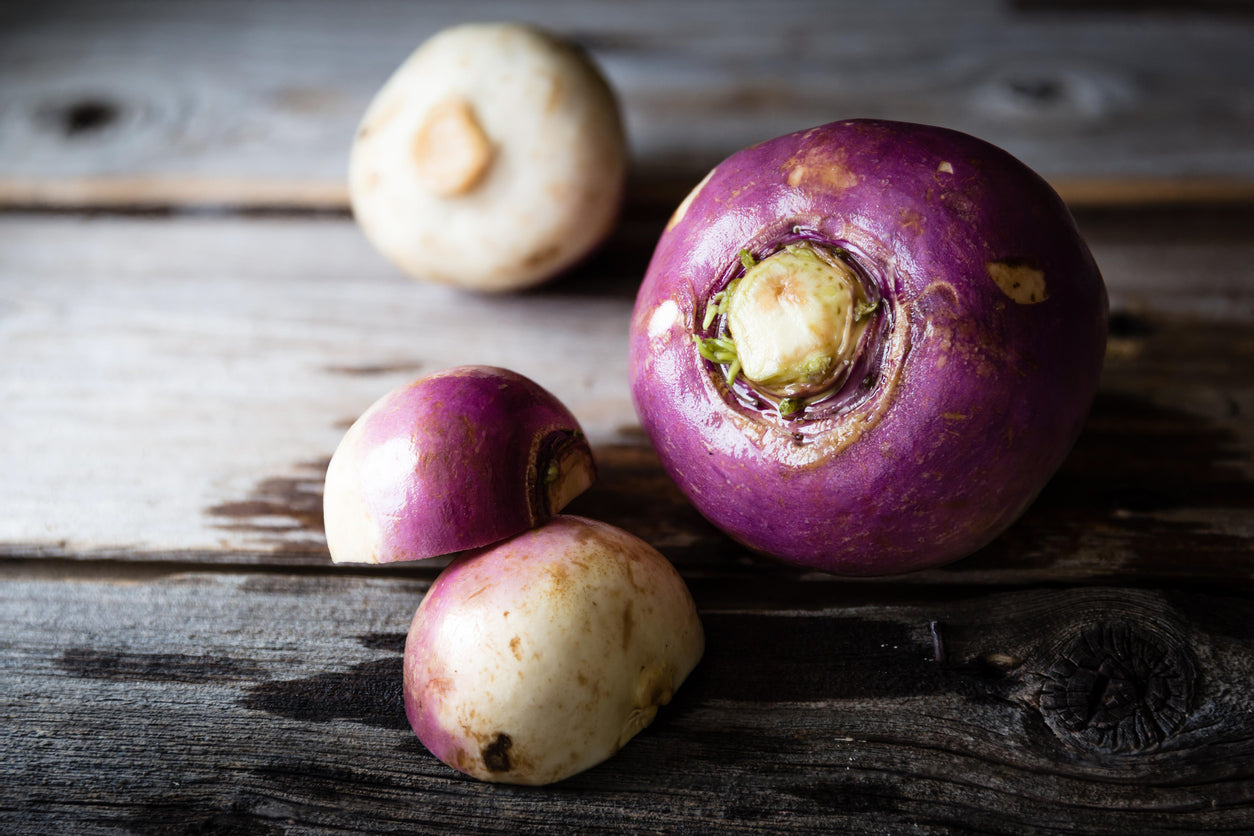3 surprising benefits of this underrated root vegetable

The rutabaga, botanically known as Brassica napus, is sometimes described as a cross between a cabbage and a turnip. At first glance, it appears to be a vegetable with a few factors working against it. After all, it has an odd, bulbous appearance, an unusual greenish-purple coloration, and a strange-sounding name.
But it would be a shame to bypass rutabagas on appearances alone. This homely, under-utilized root vegetable is a dynamo of flavor and nutrition with impressive health benefits. Let’s look at some properties that make the rutabaga worthy of respect.
Support stronger bones with rutabaga
Rutabagas are rich in essential minerals, particularly calcium, potassium, and magnesium. In a recent update published in Biometals, researchers re-examined the role of magnesium in bone health. The authors noted that almost half of all Americans consume less than optimal amounts of magnesium and reported that low intake is linked with a higher incidence of osteoporosis - involving decreased bone density and higher fracture risk.
With 20 mg of magnesium per 100-gram serving, rutabaga can help you reach the recommended daily amount, which the Office of Dietary Supplements sets at 420 mg daily for men and 350 mg for women. Rutabagas also contain vitamin K, which plays a role in bone health by keeping calcium out of the bloodstream and in the bones, where it belongs.
When it comes to supporting bone health, it appears that rutabaga’s “game” is strong! Incidentally, other foods to support healthy bones include fortified 100 percent orange juice, extra virgin olive oil, avocados, dairy products, tomatoes, and prunes.
Eating rutabaga may help you stay cancer-free
As a cruciferous vegetable, rutabaga contains glucosinolates - the same sulfur-based cancer-fighting compounds found in Brussels sprouts and broccoli. Glucosinolates combine with myrosinase, an enzyme already in the body, to form isothiocyanates (ITCs) - compounds that can trigger apoptosis (or programmed death) in cancer cells.
A 2018 review published in the Asian-Pacific Journal of Cancer Prevention characterized ITCs as anticarcinogenic and reported that consumption is associated with lower cancer incidence in population studies. In addition, animal studies have shown that ICTs can suppress tumor formation. While more study is needed, it seems likely that constituents in rutabaga may help ward off cancer, particularly of the breast, prostate, and colon.
Pamper your heart with fiber-rich rutabagas
Rutabagas are rich in antioxidants, preventing oxidative damage that may trigger heart disease. In addition, they contain healthy amounts of vitamin C, which the body needs to produce collagen - an essential component for flexible, sturdy arteries. Plus, rutabagas are rich in fiber and potassium, a combination that allows them to help relax and dilate blood vessels, thereby supporting lower blood pressure. The plentiful fiber in rutabaga also helps lower harmful LDL cholesterol, reducing the risk of artery-clogging atherosclerosis. Finally, rutabagas contain folate, a B vitamin believed to help prevent strokes.
As a nutrient-rich, low-calorie food (with a modest 37 calories per 100-gram serving), rutabaga can help maintain a healthy weight. It is also thought to promote immune health, help stabilize blood sugar, promote efficient digestion, and enhance the health of the gut microbiome. Believe it or not, rutabagas may even have mild antidepressant effects. They contain tryptophan, melatonin, and serotonin - compounds vital to emotional equilibrium and restful sleep.
Versatile rutabagas are easy to incorporate into meals
Rutabagas feature a zippy, peppery flavor balanced by an undertone of sweetness. These surprisingly tasty veggies can be roasted, steamed, baked, mashed, stir-fried, pickled, or even nibbled raw. Peel them first to remove the skin and any protective wax that may have been added.
People with a specific genotype (PAV/PAV) perceive the taste of rutabagas - and other cruciferous vegetables - differently than people without the genotype, generally experiencing them as more bitter. (To some extent, the reaction to rutabaga is genetically influenced).
You can grate raw rutabagas into a salad for a refreshing, mildly spicy accent. Or cut them into strips and prepare them like French fries. You can also roast rutabaga with a bit of olive oil and chili powder - or add your favorite herbs and spices.
This robust root veggie is truly a powerhouse when it comes to supporting health and even warding off chronic disease. Rutabaga makes a fantastic addition to your healthy diet.
Sources for this article include:






